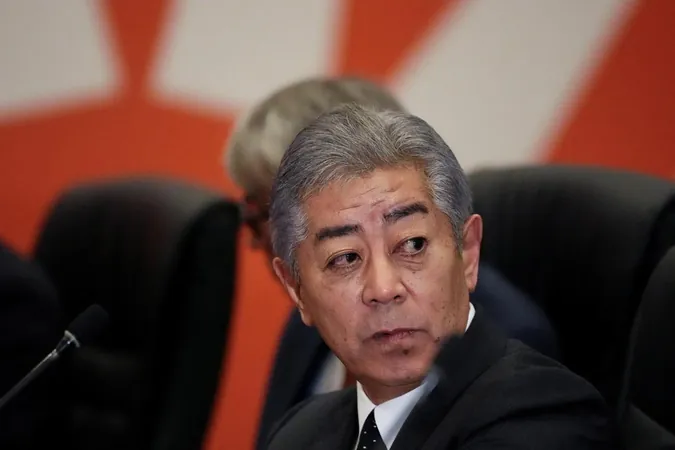
Japan's Foreign Minister Voices Grave Concerns Over China's Military Expansion
2024-12-26
Author: Wei
Japan's Foreign Minister Takeshi Iwaya in Beijing
In a significant diplomatic engagement in Beijing, Japanese Foreign Minister Takeshi Iwaya expressed "serious concerns" regarding China's ongoing military build-up during a meeting with his Chinese counterpart, Wang Yi, on December 25. This marked Iwaya's first visit to China since taking office in 2024.
Concerns Over Regional Security
Iwaya emphasized the need for vigilance, stating that Japan is “closely monitoring the situation surrounding Taiwan and recent military developments” in the region. He voiced particular apprehension about the East China Sea and the increasing military activities near the contested Senkaku Islands, which have been a longstanding point of contention between the two nations.
Call for Release of Japanese Nationals
Additionally, Iwaya urged for the "swift release" of Japanese nationals currently detained by Chinese authorities. He pointed out that the vague nature of China's anti-espionage laws is causing growing trepidation among Japanese citizens thinking about visiting China, signaling a deepening concern over the safety of travelers.
Positive Discussions Despite Tensions
Despite these tensions, there were positive notes in their discussions. The two ministers agreed on the importance of fostering a "constructive and stable" relationship, and they are working to arrange a visit by Wang to Japan in the near future. China's Foreign Ministry indicated that this visit would occur “at an appropriate time,” although they did not comment on the concerns regarding military maneuvers or detained individuals.
Historical Context of Japan-China Relations
Japan and China have historically been key trading partners; however, disputes over territorial claims and military expenditures have strained their relationship in recent years. For instance, in August, a Chinese military aircraft executed a confirmed incursion into Japanese airspace, prompting Japan to enhance its security collaboration with key allies, including the United States.
Provocative Military Actions
The backdrop of these tensions includes a series of provocative actions, such as China's test launch of an intercontinental ballistic missile into the Pacific in September, which Tokyo condemned due to the lack of prior notification. Additionally, Japan's controversial decision to release treated water from the Fukushima nuclear disaster into the Pacific Ocean has also aggravated relations, with China labeling the move "selfish" and imposing a ban on Japanese seafood imports, which it partially lifted in September.
Economic Ties and Historical Grievances
As the two ministers exited their meeting, they reiterated their commitment to rebuilding trust and promoting trade, recognizing the substantial economic ties between their nations, highlighted by the fact that China imported over $500 million worth of seafood from Japan in 2022.
Nevertheless, historical grievances linger, particularly Japan's occupation of parts of China during World War II, which continues to sour relations. Visits by Japanese officials to the Yasukuni shrine—honoring Japan's war dead, including those found guilty of war crimes—remain hot-button issues for Beijing, which accuses Tokyo of failing to adequately address its past transgressions.
Looking Ahead: Diplomatic Dialogue or Military Confrontation?
As both countries navigate their complex relationship, the world will be watching closely to see how these developments unfold and whether diplomatic dialogue can prevail over military confrontation.

 Brasil (PT)
Brasil (PT)
 Canada (EN)
Canada (EN)
 Chile (ES)
Chile (ES)
 España (ES)
España (ES)
 France (FR)
France (FR)
 Hong Kong (EN)
Hong Kong (EN)
 Italia (IT)
Italia (IT)
 日本 (JA)
日本 (JA)
 Magyarország (HU)
Magyarország (HU)
 Norge (NO)
Norge (NO)
 Polska (PL)
Polska (PL)
 Schweiz (DE)
Schweiz (DE)
 Singapore (EN)
Singapore (EN)
 Sverige (SV)
Sverige (SV)
 Suomi (FI)
Suomi (FI)
 Türkiye (TR)
Türkiye (TR)